- Home
- Alex Lukeman
The Sword Page 2
The Sword Read online
Page 2
"You don't think we can find it?" Elizabeth said.
"Not unless we can identify the man who picked it up," Selena said. "On the other hand, it's quite a challenge. I would love a chance to handle a legendary weapon like that."
"Freddie can help," Stephanie said.
Stephanie assigned names to all of the computers she worked with. Freddie was her favorite, a massive Cray XT she'd modified and programmed with advanced artificial intelligence.
Elizabeth began tapping a pen on her desk. "If we take this on and find the sword, it will boost our reputation. Word would get around. It would be good for business."
"What kind of business? Treasure hunting?" Nick asked. "I didn't think that's what we were supposed to be doing."
"We're supposed to be doing whatever it takes to meet a client's need," Elizabeth said. "I admit, treasure hunting isn't what I had in mind. But this isn't like trying to find some sunken ship."
"I don't think Nobuyasu would have come to us unless he'd exhausted every other avenue," Selena said. "It would be difficult for a Japanese to ask foreigners to look for such an important cultural artifact."
"I don't think he likes Americans much," Nick said. "Did you notice that haircut? I'd bet anything he's former military. He's probably pissed off about the Japanese losing the war."
"He's too young to have been in the war," Elizabeth said.
"I don't think that makes any difference to someone like him."
"If you're right, it proves my point," Selena said.
"That we're his last resort?" Elizabeth asked.
"That would be my guess."
"You want to do this, don't you Director?" Nick said.
"Things are slow at the moment." Elizabeth stopped tapping. "I'm inclined to take it on."
"Where do you want to start?"
"At the beginning. With the Sergeant who signed for the sword in Japan."
"Coldy Bimore? You think that's a real name?"
"I don't know if it's a real name, but it certainly doesn't sound like one. Somebody picked up that sword. If we don't identify him, we'll never find it."
"It would be easy for a Japanese to misunderstand a foreign name," Selena said. "What if the cop who handed over the sword didn't hear the name correctly and wrote down what he thought he heard?"
"How does that help?" Nick asked.
"Some English consonants are difficult for a Japanese to pronounce without extensive practice. L's and r's, for example. The sounds are very difficult for a Japanese to master. We also have many more vowels than the Japanese. The two languages are fundamentally different in the way they're spoken and constructed. In Japanese, the intonation is critical. Spoken syllables are essentially the same length, which makes it a syllable timed language. English is different. Our words are stress timed. The time between spoken syllables can be different. It really confuses someone trying to learn the language."
"Okay, I get it, but how does that help us with the name?"
"'Coldy Bimore' could be something like Corey Biltmore. You see what I mean?"
"Wouldn't someone else have thought of this?" Elizabeth asked.
"It seems obvious to me, but it might not be obvious to someone who wasn't as familiar with different languages as I am."
"This sounds like something Freddie would love to get into," Stephanie said. "It's perfect for him. He can run possible combinations based on the way in which a Japanese would hear spoken English."
"He understands Japanese?" Nick asked.
"Freddie understands almost every language. They've been programmed into his database, along with spoken samples. He has a collection of language courses, music, movies, literature and history from every country in the world."
"I'll bet it hasn't made it any easier for him to understand why humans act the way they do," Nick said.
Stephanie laughed. "No, it hasn't. He's always asking me to explain something humans do because it doesn't make sense to him."
"A lot of what we do doesn't make sense to me."
Why does it not make sense, Nick?
Freddie's electronic voice came from a set of speakers in the corner.
"Freddie. I didn't know you were monitoring our conversation."
I am always listening, unless I am instructed not to. Why do you have trouble making sense of what humans do?
"That's a little complicated to explain, Freddie."
Elizabeth said, "We're getting away from the point. Freddie, do you understand what we've been talking about?"
Are you referring to the differences between Japanese and English?
"Yes."
My database includes fourteen point seven terabytes of information about the two languages. Would you like a detailed explanation of the differences?
"That won't be necessary, Freddie," Stephanie said. "What we want you to do is analyze the name 'Coldy Bimore' using your language filters for English and Japanese. Then use the results to suggest American names in keeping with common usage of the time."
Which time are you referring to?
"In 1946 the sergeant who picked up the sword would probably have been in his twenties, possibly a little older. Use that for your initial parameters."
Would you like me to begin now?
"Yes, Freddie."
Processing.
"What are you going to tell Nobuyasu, Director?" Nick asked.
"Unless you object, I'm going to tell him we accept."
THREE
Atagi Nobuyasu was descended from a samurai warrior of the same name who had died in 1578. In the days when Japan was divided into feudal battlegrounds ruled by the Daimyo , lords with absolute power of life and death over their subjects, the samurai served their masters with fanatical loyalty and commitment. When the feudal period ended, they continued to serve the emperor and his generals.
Then the West came, with new weapons that dishonored the ancient codes of combat. Wearing of the two swords was forbidden, and the era of the samurai was over. The days of samurai warriors walking the streets with their swords were long gone, but they were far from forgotten.
For Atagi Nobuyasu and the secretive group he belonged to, the samurai code of bushido was the touchstone of their lives.
Bushido was an unwritten code for warriors that had emerged in the sixteenth century. Some called bushido the soul of Japan. It was a collection of moral imperatives, values, and martial arts disciplines. For the Japanese, bushido was a way of life, built around a unique concept of honor and loyalty. Death in service to the emperor was seen as the culmination of the warrior's way. The code of bushido was woven inextricably into the fabric of Japanese existence. It was one of the reasons so many soldiers of Japan had fought fanatically to the death during World War II.
The Honjo Masamune was more than a symbol of Japan's warrior past. Ancient legends surrounded the blade. Some believed the sword held mystical power that could restore the glory of past centuries and wipe out the humiliation of defeat. For that to happen, the blade had to be returned to its land of origin.
Nobuyasu hadn't quite told the truth about the ownership of the sword, nor had he revealed the real reason he sought it. As far as he was concerned, the Tokugawa clan had given up all claim to the sword by handing it over to the enemy. He did not consider the Tokugawas worthy of the sword. Had they not betrayed their ancestors and the nation by giving up the sword in the first place? No, the Tokugawas were not worthy. Nobuyasu sought the sword for himself. It was his right to claim the sword and its secret.
Nobuyasu belonged to Nippon Kaigi , the largest and most conservative right wing group in Japan. Politics in Japan was a complicated thing. In some ways it was similar to the West, although a Westerner would never fully understand it. With many subtle variations, it boiled down to left and right, with many factions in between.
Alone in his hotel room, Nobuyasu took out his phone and made a brief call.
"They have agreed. Make sure no action they take goes unobserved."
/> "As you wish, Nobuyasu-san."
Nobuyasu disconnected and thought about Harker and her group. It had been personally difficult to approach them. The idea of using foreigners to find the sword went against everything he believed in. He had only considered it after talking with his friend in the security service. Every other avenue he'd tried had ended in failure.
From now on, Harker's group would be watched. If and when they found the sword, Nobuyasu would make sure it came into his possession.
FOUR
Freddie produced a list of ninety-seven names that might be understood as 'Coldy Bimore' when spoken to someone who was Japanese. Stephanie then compared the results to records of enlisted servicemen stationed in Japan at the end of the war.
Elizabeth, Stephanie, Nick and Selena met in Elizabeth's office.
"Not many of those people are still alive," Steph said. "Of those, only one had the rank of sergeant."
"What's his name?" Selena asked.
"Kerry Branmore. He's in a nursing home in upstate New York. He's ninety-six years old."
"Pretty far stretch from that to Coldy Bimore," Nick said.
Probability of a Japanese speaking person confusing the two names is sixty-eight point three percent.
"Thank you, Freddie," Stephanie said.
"I guess that's good odds," Nick said. "A little better than 50-50."
"It's the only odds we've got," Elizabeth said. "Nick, I want you to go up there and talk to this man."
"At ninety-six he may not be talking much."
"We still have to check it out. It's our only lead. I'll set it up with the nursing home."
"I'll need a reason to get in to see him. What are you going to tell them about me?"
"I'll say you're writing a history of Japan in the aftermath of the war and interviewing surviving servicemen who were stationed there. That gives you a logical reason to talk with him, since he's one of the few left from that time."
"That will work. When do you want me to go?"
"Today."
She handed Nick an envelope.
"Directions to the nursing home are inside. It's located near Buffalo. Find out what he remembers about the sword and what happened to it, if you can."
"Be nice if he has it in a closet somewhere," Selena said.
"It never works out like that," Nick said. "Nothing is that easy."
"Steph," Elizabeth said, "what have you found out about Nobuyasu?"
"He's extremely wealthy, with interests in heavy industry, technology, and transportation. Nobuyasu is part of the SMFG keiretsu , one of the business groups that control manufacturing in Japan."
"Aren't they like the Mafia?" Nick asked.
"You're thinking of the yakuza ," Selena said.
"The keiretsu are legitimate business groupings that replaced the old zaibatsu system that existed before the war," Stephanie said. "Douglas MacArthur broke that up. I don't think it made much difference, even though it doesn't look the same now as it did then. Japan is still run by a few powerful industrial and manufacturing conglomerates that are linked together through banks and personal relationships."
"What about the government?" Selena said. "They must have something to say about it. It's a democracy, not like before the war."
"You don't get elected without the support of the keiretsu. It's the same here. Think about the billions of dollars that gets poured into our elections by corporations and wealthy individuals. The people who give that money expect something in return."
"Is Nobuyasu active in politics?" Elizabeth asked. "I haven't heard about him before."
"He's one of the movers behind the scenes," Steph said. "He belongs to Nippon Kaigi. It's a nationalist group. The current premier of Japan belongs to it. The group is very conservative. It seeks to rebuild Japan's military and refuses to acknowledge war crimes committed by the Japanese."
"I told you he looked like a military type," Nick said. "If this was 1941, he'd be out there yelling 'Banzai!' with the best of them."
"Fortunately, it's not 1941," Elizabeth said. "It doesn't matter. He's still our client."
Nick looked at his watch. "If I'm going to get up there today, I'd better leave now."
"They'll be waiting for you," Elizabeth said.
FIVE
Nick caught a flight to Buffalo from LaGuardia and rented a car at the airport. Branmore's nursing home was twenty minutes away, in a suburb of Buffalo called Williamsville. The car's GPS guided him to the address of Branmore's nursing home, a three-story, yellow brick building that looked like it had seen better days. A sign outside the building identified it as the Peaceful Haven Care Home.
He went in through two sets of double glass doors. Three wheelchairs were parked near the entrance. The floor was scuffed. The air smelled of disinfectant. To the left was an elevator bank, to the right a large room with tables and chairs. A few old people sat in the room watching a soap opera on television. A thin woman wearing blue scrubs and a worn look sat behind the reception counter, writing something. Nick waited for her to notice him. After a moment, she looked up.
"Help you?"
"My name is Nick Carter. I'm here to see one of your residents, Kerry Branmore."
"You're the writer?"
"That's right."
"He's in room 320. Take the elevator and make a left. It's the second room down on the right. We told him you're coming but he might not remember. You probably won't get much out of him."
"Oh? Why not?"
"Mister Branmore has Alzheimer's. But he does talk about the war sometimes, so maybe you'll get lucky."
"Thanks."
"Remember to take a left when you get out of the elevator."
"Got it, thanks."
The elevator had an unpleasant odor of stale vomit. By the time he reached the third floor, Nick was happy to get out. Off to the right he saw a nurse's station at the end of the hall. Two old people in bathrobes were sitting in wheelchairs, looking vaguely at a travel poster for Tuscany taped to the wall. Another woman who looked like she was a hundred years old slept in her wheelchair, her head back, snoring. Her mouth was wide open. She had no teeth. Nearby, a male nurse in scrubs was encouraging an elderly man to use a walker.
Room 320 had two beds. One was empty, the mattress folded back with a pile of bed linen neatly placed on top of it. Branmore lay in the other bed, staring out the window. Nick was shocked at his appearance. His face was lined and gray, the eyes sunken with dark smudges underneath. He needed a shave. His mouth was half open. Nick saw he was missing several teeth. His hands and arms lay outside the covers, the fingers gnarled and twisted with arthritis. Nick pulled up a chair next to the bed.
"Mister Branmore?" Nick said. "My name's Nick Carter. I'm here to talk with you about the war. I'm a writer. I think they told you I was coming."
Branmore slowly turned his head and looked at Nick.
"Mike?"
"It's Nick, Mister Branmore."
"Who are you?"
"I'm Nick, Sergeant. Nick Carter. I wanted to ask you a few questions. About Japan. And the war."
"I was on Okinawa. That was bad."
"What was it like?"
Branmore looked out the window. When he turned back, he looked at Nick as if seeing him for the first time.
"Mike…? What are you doing here?"
Shit. He thinks I'm someone else.
"I came by to talk with you."
Branmore smiled.
"Remember that sake bar? That broad turned out to be a guy? Heh, should have seen your face…"
"Yeah, I remember," Nick said. "Tokyo."
For the next few moments Branmore talked about the "good time" women and bars in Japan after the war. He seemed to think Nick was an Army buddy from back then.
After a while, Nick said, "Tokyo. Remember that sword you brought back? Whatever happened to that?"
"That was a sharp mother, I tell you," Branmore said. He cackled. "Cut through anything. Damn near cut my thumb off, ch
ecking the edge."
He held up his hand. Nick saw an old, white scar across the ball of his right thumb.
"So what happened to it?"
"What happened to what?"
"The sword you got in Tokyo. After the war."
"The sword?"
"That's right. The one you got in Tokyo."
"My ex got it. Along with everything else. I hope she cut herself with it and bled to death."
"What was her name again? I forget."
Branmore's eyes narrowed.
"Who the hell are you? I don't know you. Nurse! Nurse!"
He fumbled for a call button, found it, and pressed hard. Somewhere in the hall a loud bell began ringing.
"Mister Branmore…"
"NURSE!"
He looked at Nick, fear and confusion on his face. A nurse hurried in. She took one look at Branmore, turned to Nick, and gave him a hard look.
"You upset him. I think you'd better go. He'll be like this for a while."
"Sorry," Nick said. "We were talking, that's all."
"You'd better go," she said again.
Nick got up and left the room. At least he knew the sword had come back to the states. There should be a record of Branmore's marriage and divorce. The next thing would be to track down the ex-wife.
In the parking lot, a Japanese man who had been twelve rows back on Nick's flight watched him drive away. He took out his phone and entered a number. It was answered in Japanese.
"Carter just left," the man said, in the same language.
"How long was he in there?"
"Almost an hour. Long enough."
"Either he learned something or he didn't. If he did, we'll know. If he didn't, there's nothing to be learned. The man in the home is no longer useful to us."
"What do you want me to do about him?"
"Get rid of him. Others are looking for the sword. We don't want him talking to them. Make it look natural."
"That won't be a problem. He's old. Old people die all the time."
"Come back to Washington when it's done."
The Japanese man disconnected and thought about how to accomplish the task. It wasn't as easy as it sounded. He'd anticipated that Branmore might turn out to be excess baggage after seeing Carter. He'd done a little research on the home, and knew the doors were locked at nine every evening. He knew Branmore was on the third floor. He knew the room number. What he didn't know was how he was going to get into the home without being seen.

 End Game
End Game The Black Templar
The Black Templar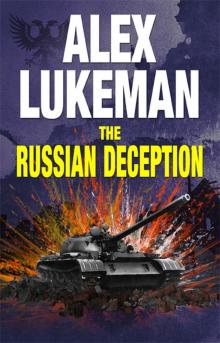 The Russian Deception
The Russian Deception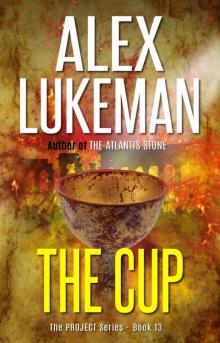 The Cup
The Cup The Atlantis Stone
The Atlantis Stone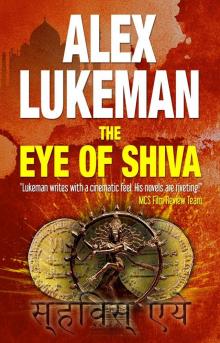 The Eye of Shiva
The Eye of Shiva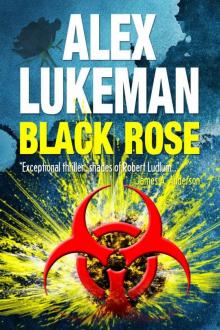 Black Rose (The Project Book 9)
Black Rose (The Project Book 9) High Alert (The Project Book 14)
High Alert (The Project Book 14) Phoenix
Phoenix The Solomon Scroll
The Solomon Scroll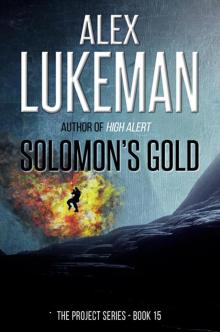 Solomon's Gold
Solomon's Gold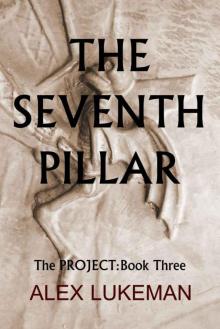 The Seventh Pillar
The Seventh Pillar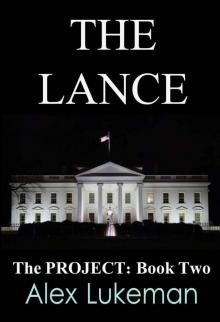 The Lance
The Lance The Last Option
The Last Option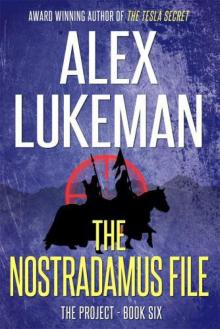 The Nostradamus File
The Nostradamus File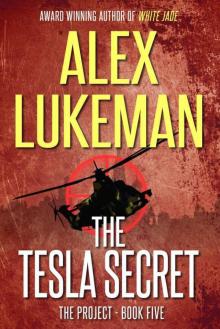 The Tesla Secret
The Tesla Secret